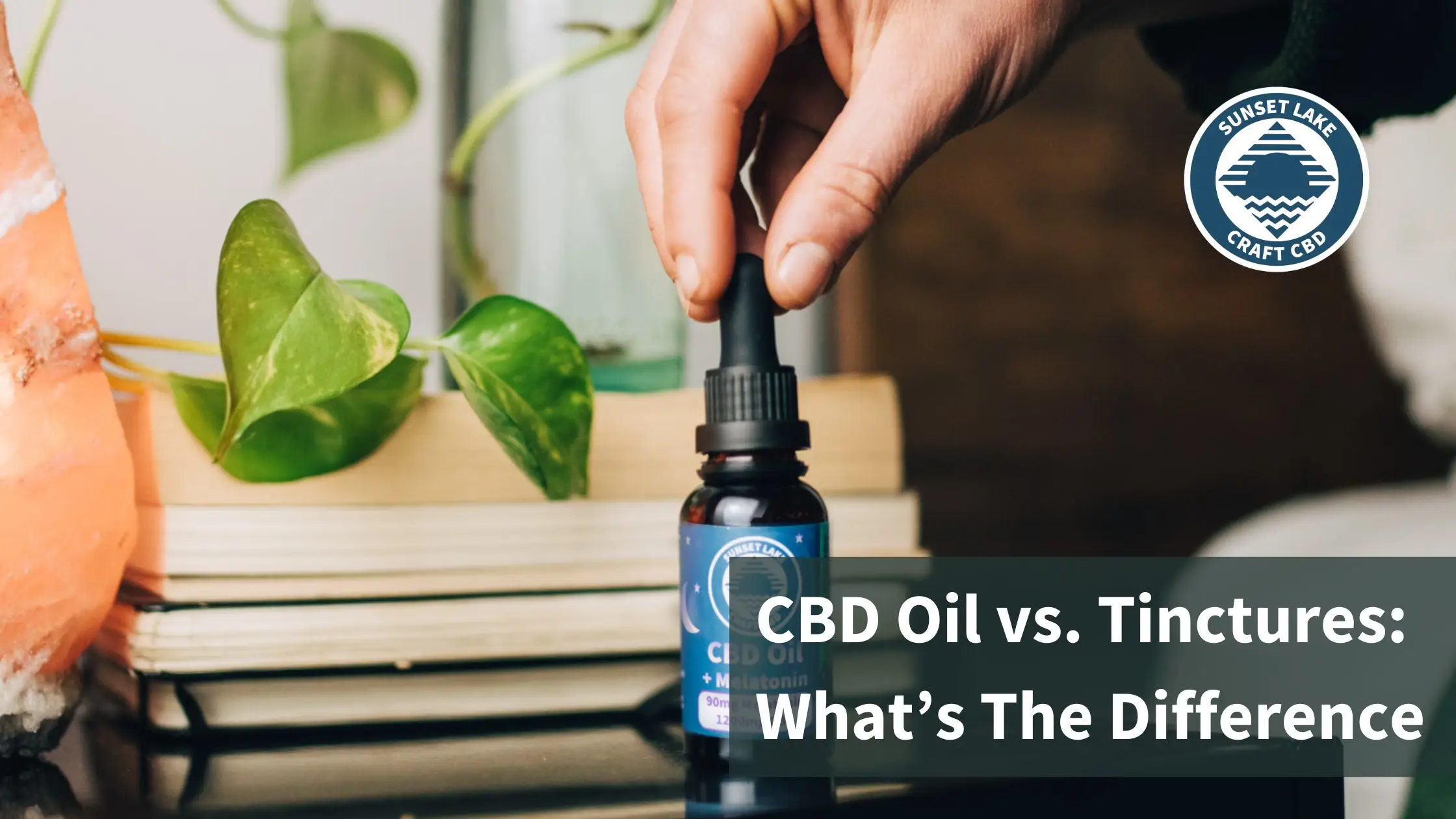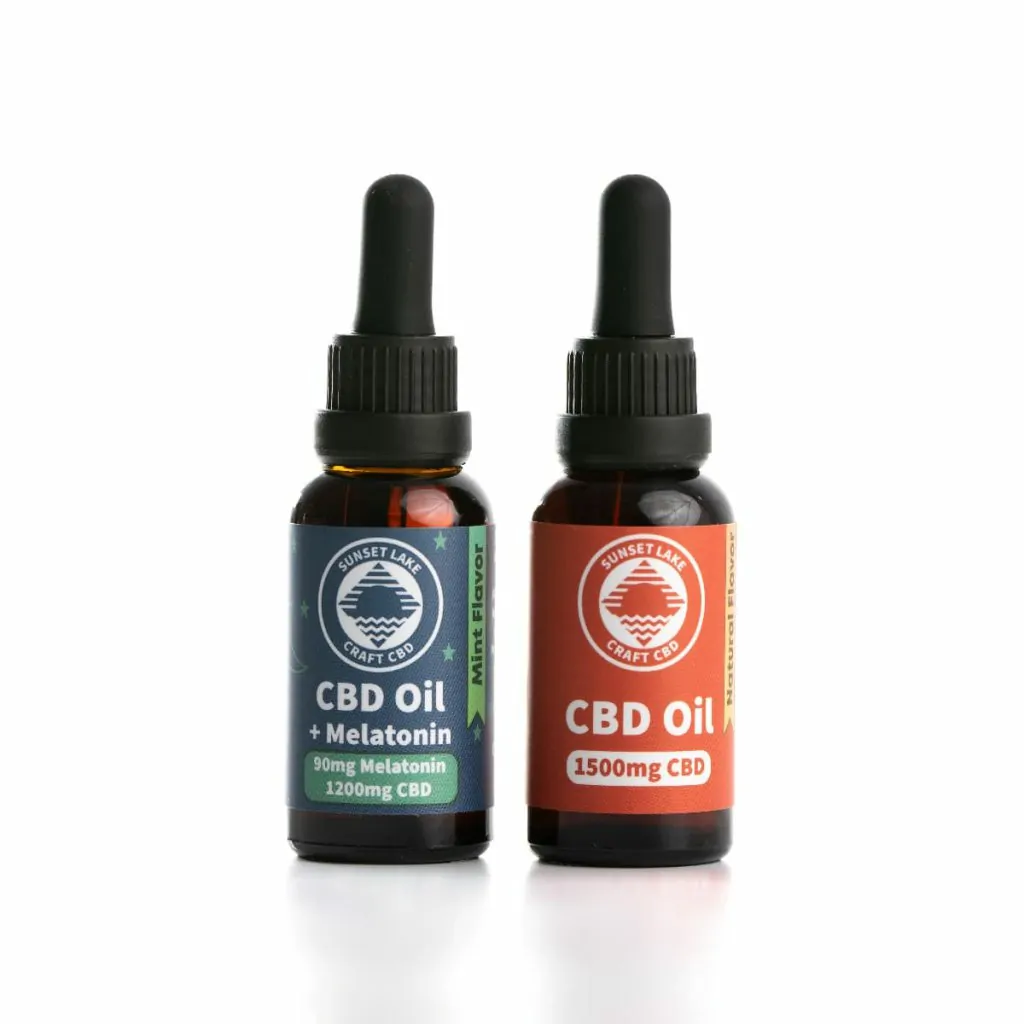No products in the cart.
CBD Oil vs. Tinctures: What’s the Difference?

If you’ve been shopping around for CBD oil, you may have also come across information about CBD tinctures, too. Even more, you may notice that they look nearly identical in most cases; so are CBD Oil and CBD Tinctures the same thing?
By the end of this blog post, you’ll know
- The differences between CBD oils vs. CBD Tinctures
- What a CBD Oil Tincture is
- How to use each product
- And how to prepare yourself as a potential buyer
What Is CBD & What Does It Do?
CBD, short for cannabidiol, is one of more than 100 cannabinoids produced by the cannabis plant. Unlike its more famous counterpart, THC, CBD is not psychoactive and will not make users feel high.
Instead, CBD works with our endocannabinoid system to help regulate our body’s sleep cycle, mood, memory, appetite, and inflammation response.
Related: CBD vs. THC: What’s The Difference?
CBD Oils vs. Tinctures
Tinctures and oils are two of the most common ways to take CBD. While they both come packaged in small glass bottles, there are some important differences that we’ll explore in this section.
What Is A CBD Tincture?
A true tincture is an herb or medicinal substance suspended in alcohol. You can technically make a tincture with just about any herb that you deem beneficial.
Traditionally, we would make a CBD using just two ingredients:
- High-proof neutral spirit: You can use spirits like vodka or grain alcohol. Generally, you would want to use spirits with proofs higher than 80.
- CBD-rich hemp flower: premium hemp flower with high levels of CBD will make for a potent infusion.
How To Make A CBD Tincture
To make a CBD tincture, we would take our CBD hemp flower and grind it into smaller pieces to increase the surface area. We would then add the flower to our alcohol and shake thoroughly. Once combined, let the solution sit in darkness for at least at least 30 days.
You can speed up the infusion process by first decarboxylating your flower. However, this will change the flavor of the final product.
What Is CBD Oil?
CBD oil can be one of two things:
- Extract Solution: This is the more common form of CBD oil. It involves taking a hemp extract and dissolving it in a carrier oil. This is the type of CBD oil that Sunset Lake CBD makes. We combine ethanol-extracted CBD concentrates (like resin, distillate, and isolate) and organic MCT oil.
- Lipid Extraction: This type of extraction isn’t as popular in the CBD world because of the scale limitations. To make a lipid extract CBD oil, you’ll need to combine CBD-rich hemp flower into a carrier oil of your choosing.
You can read all about how to make your own lipid extract CBD oil at home here.

What Is A CBD Oil Tincture
CBD Oil Tincture is the nomenclature we use at Sunset Lake CBD to cover all of our bases. Technically, we make our CBD oils with CBD extract with ethanol, so it’s like a happy medium between the two.
The Differences Between CBD Oil vs. Tinctures
While we’ve already mentioned a few of the differences between CBD oils and tinctures, let’s recap them.
- Solvent: The first and biggest difference between the two is the solvent used to suspend the CBD. True tinctures use high-proof ethanol, and CBD oils use carrier oils like MCT, olive oil, or coconut oil.
- Taste: Because CBD tinctures are made with alcohol, they are known to have a bitter taste. Because we can make CBD oils with extracts and flavoring, many consumers tend to favor the oils.
- Use: Unlike CBD tinctures, you can also apply CBD oils topically. MCT and coconut oil are gentle on the skin, whereas alcohol tends to dry it out.
The Similarities
Let’s preface this section by first saying that most CBD retailers, Sunset Lake included, use the terms tincture and oil interchangeably. In this section, though, CBD oil will refer to CBD suspended in oil, and CBD tincture to refer to CBD suspended in alcohol.
- Packaging: Both tinctures and oils are packaged in small glass bottles capped with rubber bulbs and glass pipettes. The identical packaging can lead to some confusion among buyers.
- Use: You use oil and tinctures almost the same way. You can either use them sublingually and apply the solution under your tongue, or you can add either to food or beverages. For the latter, we would suggest using your discretion. CBD tinctures may be better suited for beverages, whereas oil can mix well with just about any food that has fat or oil in it.
- Effects: The effects of both CBD oils and tinctures are nearly the same. At the end of the day, both are vehicles to get CBD into your bloodstream. Both do so wonderfully and effectively.
How To Be A Better Buyer
Before you buy any CBD online, you’ll want to arm yourself with some knowledge to make yourself a smarter shopper. Consider the following,
Ask For What You Want
Because CBD tinctures are more often than not actually CBD oil, if you’re looking specifically for an alcohol-based tincture, be sure to ask for one. This is especially true if you have an allergy to coconuts. Most CBD oils and mislabeled tinctures contain MCT oil derived from coconuts.
Consider Your Budget
If you’re looking to maximize your relief, shop around. Some of the bigger brands out there keep their prices high because they have brand recognition.
Most CBD oils and tinctures should be priced around $0.01-0.03 per milligram of CBD. At larger potencies, that price per milligram should be even lower.
Ask For Test Results
Whether you prefer tinctures or oils, you should always look for reputable companies that provide current certificates of analysis (COAs).
When you read your COA, it will tell you:
- Potency – The total amounts of CBD, THC, and other cannabinoids should be clearly legible on every product’s testing paperwork. Batch variation can vary, but if your COA is off by more than 10% the advertised amount of CBD, that’s a problem.
- Cannabinoid profile – This will tell you what cannabinoids are present in your product. Full-spectrum products will contain trace amounts of THC. Broad-spectrum CBD and isolate products should contain no THC, though.
- Expiration – Your COA should be no more than one year old. Smaller brands may test less often. Larger brands tend to test every batch.
FAQ
Are CBD Oil & CBD Tinctures The Same?
No. CBD tinctures and CBD oils are terms that are used interchangeably, but they are technically different. CBD tinctures are made with alcohol, and CBD oils are made with an oil base.
Do CBD Tinctures And CBD Oils Do The Same Thing?
Yes, oils and tinctures should be equally effective as they are merely methods of delivering CBD. The only meaningful difference between the two is the solution in which the CBD is suspended.
How Long Before My CBD Tincture Starts Working?
If you take CBD sublingually, you should expect to start feeling the benefits within 30 minutes. The membrane under your tongue is thin and allows for the CBD to enter your bloodstream quicker.
If you choose to consume your tincture or oil with food, expect to start feeling the benefits after about one hour. This onset time can change due to a number of factors.
Can I Use CBD Oil If I’m Pregnant?
We do not recommend using any CBD product if you are pregnant or breastfeeding.
